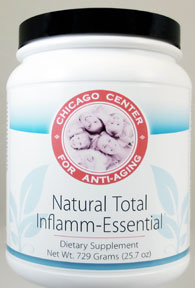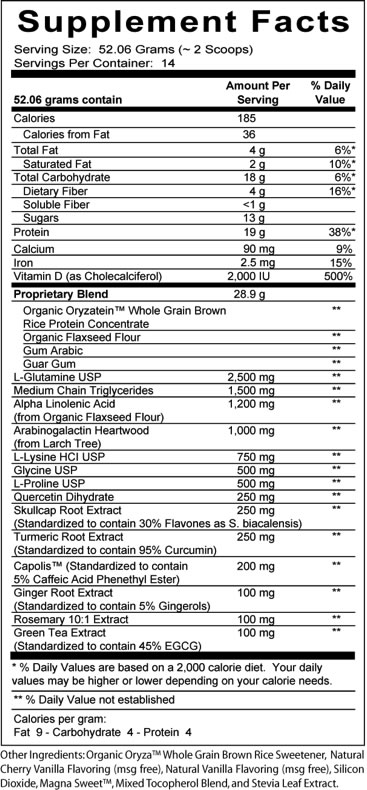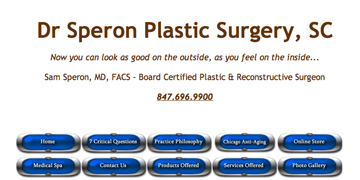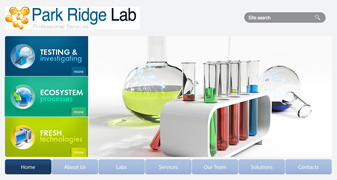Buy Cheap All-Natural Chicago Total Inflamm-Essential Anti-Aging Herbal Supplements Vitamins
Why pick our Natural Total Inflamm-Essential Herbal Supplement?
There are many options available today when choosing vitamins and anti-aging supplements. This means that you have to be careful as a consumer and make sure you choose a reliable manufacturer who only uses the highest quality ingredients. The Chicago Center For Anti-Aging has partnered with one of the most reputable manufacturers which helps ensure the quality of our private line of vitamins and anti-aging supplements. Quality is what should be the most important attribute you should look for to help make your decision, not cost. Look for quality you can trust.
 Natural Total Inflamm-Essential
Natural Total Inflamm-Essential
Product Rationale
 Total Inflamm-Essential can be used as foundational support for individuals with chronic inflammatory conditions-especially, but not limited to the gastrointestinal tract.
Total Inflamm-Essential can be used as foundational support for individuals with chronic inflammatory conditions-especially, but not limited to the gastrointestinal tract.
Ingredient Information
Turmeric/Curcumin:
• Curcumin is a potent antioxidant agent from turmeric, a traditional spice often used in Middle Eastern cooking. Curcumin has potent anti-inflammatory and chemoprotective activities.
• Numerous studies show curcumin has strong NFkB inhibiting properties. NFkB plays a crucial role in many chronic inflammatory conditions, including gastrointestinal conditions. NFkB is strongly associated with cell death and inducing the expression of several inflammatory mediators including TNF-α, IL-8, COX-2, LOX, and iNOS.1
• Besides being a strong anti-inflammatory agent, curcumin also induces heat shock proteins as well as inhibits tissue growth factor beta (TGF-β) and fibrogenesis. These attributes, along with its potent anti-inflammatory properties, are thought to contribute to its positive effects in gastrointestinal conditions such as Crohn’s disease.1
• Several human, in vitro, and animal studies show curcumin has beneficial effects in inflammatory bowel disorders including Crohn’s, colitis, and IBD, mainly through its ability to inhibit NFkB, which is elevated in those with inflammatory bowel diseases.1,2,3,4,5
• A study in patients with symptoms of peptic ulcers, found turmeric supplementation was able to completely heal some of the patients ulcers, while relieving abdominal pain and discomfort in others to the point they could eat “normal” foods instead of soft meals.6 An in vitro study shows curcumin inhibits H.pylori infection and inflammation of the gastric mucosal cells by inhibiting the activation of NFkB and preserving IkBα (a NFkB regulator).1
Caffeic Acid Phenethyl Ester (CAPE):
• Caffeic acid phenethyl ester (CAPE) is a potent anti-inflammatory component of bee propolis. Bee propolis has been used since ancient times for its many medicinal properties. Besides having potent anti-inflammatory properties, CAPE also has immunomodulatory activity, as well as antimicrobial properties.7,8
• Like curcumin, in vitro studies show CAPE inhibits NFkB, along with other inflammatory mediators including TNF-α, IL-1β, IL-8 and IL-12.7,9,10,11 CAPE also prevents the degradation of IkBα.11,12
• A study looking at the effects of bee propolis with and without CAPE in rats with paw oedema, found propolis with CAPE inhibited the oedema while propolis without CAPE did not.
• In a study examining the effects of CAPE in rats with induced colitis, it was found that CAPE reduced the levels of colonic NFkB, IL-1β, and TNF-α as well as reducing gross colonic injury.7
• In a study examining the effects of CAPE on H.pylori induced NFkB and AP-1 in the gastric epithelial cell line AGS, CAPE inhibited H.pylori induced NFkB and AP-1 DNA-binding in a dose dependant manner. CAPE also prevented H.pylori induced degradation of IkBα, as well as TNF-α and IL-8 production and COX-2 expression.11
Green Tea (EGCG):
• Green tea is a potent antioxidant and anti-inflammatory agent that has many historical uses for health and well being. Green tea contains natural polyphenols called catechins. Catechins are responsible for the health benefits related to tea consumption. One specific catechin, known as EGCG, is the most studied catechin in green tea.
• EGCG blocks NFkB, along with other inflammatory mediators including TNF-α, COX-2, IL-8and PGE2. The primary mechanism by which EGCG blocks NFkB is through its ability to suppress the phosphorylation of IkBα and its ability to inhibit IKK (IkBα activator).13,14,15,16,17 One study showed EGCG was the most potent inhibitor of IKK among green tea polyphenols.13
• Cigarette smoke strongly induces an inflammatory response throughout the body. In an in vitro study examining the effects of EGCG on human bronchial epithelial cells with inflammatory damage by cigarette smoke, it was found that the EGCG was able to suppress the phosphorylation of IkBα, thereby suppressing NFkB.14
• In a rat model of colitis, EGCG given to rats with acetic acid-induced colitis improved disease activity index, colon mucosa damage index, and histological scores compared to placebo. Rats given EGCG also had reduced nitric oxide, TNF-α, INF-gamma, and NFkB levels.16
Arabinogalactan:
• Larch arabinogalactan is a fermentable fiber that is commonly used to support the immune system in multiple ways.
• Larch arabinogalactan stimulates NK cell cytotoxicity and other functional aspects of the immune system. Decreased NK cell activity is often associated with poor health. 18
• Acting as a prebiotic agent to intestinal flora, arabinogalactan has a beneficial effect on enhancing microflora, including Bifidobacteria and Lactobacillus.18
• Arabinogalactan has been shown to increase the production of short-chain fatty acids, including butyrate-a critical SCFA for colonic epithelial cells.18
• In an animal (mouse) study examining the effects of arabinogalactan on organ toxicity associated with amphotericin B, it was found that arabinogalactan was able to decrease IL-1β and TNF-α in certain organs.19
Skullcap Root:
• Skullcap root, Scutellaria baicalensis, is a popular herb frequently used in China for the treatment of inflammation, hypertension and cardiovascular conditions.20
• Studies show skullcap has antioxidant properties- scavenging oxidative radicals, is able to attenuate NFkB, and inhibits several genes important for regulation of the cell cycle, as well as suppress COX-2 expression.20,21
• In rats with ethanol-induced gastric damage, wogonin (a flavonoid derived from Skullcap) was found to provide a protective effect through either its anti-inflammatory effects or preventive induction of apoptosis in the stomach.22
Quercetin:
• Quercetin is a flavonoid found abundantly throughout the plant kingdom. Quercetin has antioxidant and anti-inflammatory properties.
• Quercetin enhances intestinal barrier function which is an important protective effect against barrier disturbances in intestinal inflammation.23,24,25
• Quercetin stabilizes mast cells, research suggests that stabilization of mast cells in the gastrointestinal tract may be a key mechanism to protect the gastrointestinal tract from injury.26
L-Glutamine:
• Glutamine is a non-essential amino acid. It is the most abundant amino acid in the body and plays a large role in gut health.
• Low levels of glutamine are associated with a decrease in the immune response, changes in the intestinal mucosa and gut associated lymphoid tissue, and a decreased antioxidant capacity.27
• Glutamine protects the gut against injury and increases in permeability by enhancing the expression of heat shock proteins, which protect cellular proteins from damage and prevent cellular injury and death.28
• Glutamine has anti-inflammatory and immune modulating activities. Glutamine attenuates nuclear binding/activation of NFkB and prevents the degradation of IkBα.28
• Glutamine given to critically ill patients has been found to improve gut permeability, decreased plasma endotoxin levels, improve immune markers, and decrease the length of hospitalization.29,30
Vitamin D:
• Vitamin D is widely known for its bone and cardiovascular benefits. It is well established in the literature that patients with IBD and other gastrointestinal conditions have higher rates of vitamin D deficiency than their counterparts.31,32
• In patients with IBD, lower serum concentrations of vitamin D have been associated with longer disease duration, higher disease activity, higher CRP levels, poor nutritional status, poor bone health, and small bowel resection.31
Dosage
As a dietary supplement, mix 2 scoops of InflammaCORE with water or the beverage of your choice, once daily or as recommended by your health care professional.
Contraindications, Adverse or Other Reactions
Do not consume this product if you are pregnant or nursing. Consult your physician for further information. This product contains corn.
How can I purchase this Natural Total Imflamm-Essential Vitamin?
Even if you are not a member of the Chicago Center For Anti-Aging, you can still purchase any of our private and unique anti-aging supplements and vitamins. You can drop by our office anytime and pick up any of our products. We are conveniently open 7 days a week from 8am-8pm.
If you want to place an order for delivery, call us at 847.696.9900 and you can order anything you want. Mention our website and you will receive 2 day USPS shipping for any sized order for only $5!
Finally, you can also order online at www.buycheapbargains.com, which is the only place online allowed to sell our products...
References
1. Bengmark, S., Mesa, M. D. et al. Plant-derived health: the effects of turmeric and curcuminoids. Nutr Hosp. 2009; 24(3):273-281.
2. Holt, P. R., Katz, S. et al. Curcumin therapy in inflammatory bowel disease: a pilot study. Dig Dis Sci. 2005; 50(11):2191-2193.
3. Jian, Y. T., Mai, G. F. et al. Preventive and therapeutic effects of NF-kappaB inhibitor curcumin in rats colitis induced by trinitrobenzene sulfonic acid. World J Gastroenterol. 2005; 11(12):1747-1752.
4. Ukil, A., Maity, S. et al. Curcumin, the major component of food flavour turmeric, reduces mucosal injury in trinitrobenzene sulphonic acid-induced colitis. Br J Pharmacol. 2003; 139(2):209-218.
5. Atreya, I., Atreya, R. et al. NF-kappaB in inflammatory bowel disease. J Intern Med. 2008; 263(6):591-596.
6. Prucksunand, C., Indrasukhsri, B. et al. Phase II clinical trial on effect of the long turmeric (Curcuma longa Linn) on healing of peptic ulcer. Southeast Asian J Trop Med Public Health. 2001; 32(1):208-215.
7. Fitzpatrick, L. R., Wang, J. et al. Caffeic acid phenethyl ester, an inhibitor of nuclear factor-kappaB, attenuates bacterial peptidoglycan polysaccharide-induced colitis in rats. J Pharmacol Exp Ther. 2001; 299(3):915-920.
8. Borrelli, F., Maffia, P. et al. Phytochemical compounds involved in the anti-inflammatory effect of propolis extract. Fitoterapia. 2002; 73 Suppl 1:S53-S63.
9. Ansorge, S., Reinhold, D. et al. Propolis and some of its constituents down-regulate DNA synthesis and inflammatory cytokine production but induce TGF-beta1 production of human immune cells. Z Naturforsch C. 2003; 58(7-8):580-589.
10. Orban, Z., Mitsiades, N. et al. Caffeic acid phenethyl ester induces leukocyte apoptosis, modulates nuclear factor-kappa B and suppresses acute inflammation. Neuroimmunomodulation. 2000; 7(2):99-105.
11. bdel-Latif, M. M., Windle, H. J. et al. Caffeic acid phenethyl ester modulates Helicobacter pylori-induced nuclear factor-kappa B and activator protein-1 expression in gastric epithelial cells. Br J Pharmacol. 2005; 146(8):1139-1147.
12. Song, J. J., Cho, J. G. et al. Inhibitory effect of caffeic acid phenethyl ester (CAPE) on LPS-induced inflammation of human middle ear epithelial cells. Acta Otolaryngol. 2008; 128(12):1303-1307.
13. Yang, F., Oz, H. S. et al. The green tea polyphenol (-)-epigallocatechin-3-gallate blocks nuclear factor-kappa B activation by inhibiting I kappa B kinase activity in the intestinal epithelial cell line IEC-6. Mol Pharmacol. 2001; 60(3):528-533.
14. Syed, D. N., Afaq, F. et al. Green tea polyphenol EGCG suppresses cigarette smoke condensate-induced NF-kappaB activation in normal human bronchial epithelial cells. Oncogene. 2007; 26(5):673-682.
15. Huang, G. S., Tseng, C. Y. et al. Effects of (-)-epigallocatechin-3-gallate on cyclooxygenase 2, PGE(2), and IL-8 expression induced by IL-1beta in human synovial fibroblasts. Rheumatol Int. 2009;
16. Ran, Z. H., Chen, C. et al. Epigallocatechin-3-gallate ameliorates rats colitis induced by acetic acid. Biomed Pharmacother. 2008; 62(3):189-196.
17. Dryden, G. W., Song, M. et al. Polyphenols and gastrointestinal diseases. Curr Opin Gastroenterol. 2006; 22(2):165-170.
18. Kelly, G. S. Larch arabinogalactan: clinical relevance of a novel immune-enhancing polysaccharide. Altern Med Rev. 1999; 4(2):96-103.
19. Falk, R., Hacham, M. et al. Induction of interleukin-1beta, tumour necrosis factor-alpha and apoptosis in mouse organs by amphotericin B is neutralized by conjugation with arabinogalactan. J Antimicrob Chemother. 2005; 55(5):713-720.
20. Li-Weber, M. New therapeutic aspects of flavones: the anticancer properties of Scutellaria and its main active constituents Wogonin, Baicalein and Baicalin. Cancer Treat Rev. 2009; 35(1):57-68.
21. Li, B. Q., Fu, T. et al. The flavonoid baicalin exhibits anti-inflammatory activity by binding to chemokines. Immunopharmacology. 2000; 49(3):295-306.
22. Park, S., Hahm, K. B. et al. Preventive effect of the flavonoid, wogonin, against ethanol-induced gastric mucosal damage in rats. Dig Dis Sci. 2004; 49(3):384-394.
23. Amasheh, M., Schlichter, S. et al. Quercetin enhances epithelial barrier function and increases claudin-4 expression in Caco-2 cells. J Nutr. 2008; 138(6):1067-1073.
24. Suzuki, T. and Hara, H. Quercetin Enhances Intestinal Barrier Function through the Assembly of Zonnula Occludens-2, Occludin, and Claudin-1 and the Expression of Claudin-4 in Caco-2 Cells. J Nutr. 2009;
25. Hering, N. A. and Schulzke, J. D. Therapeutic options to modulate barrier defects in inflammatory bowel disease. Dig Dis. 2009; 27(4):450-454.
26. Penissi, A. B., Rudolph, M. I. et al. Role of mast cells in gastrointestinal mucosal defense. Biocell. 2003; 27(2):163-172.
27. Bonet, A. and Grau, T. [Glutamine, an almost essential amino acid in the critically ill patient]. Med Intensiva. 2007; 31(7):402-406.
28. Wischmeyer, P. E. Glutamine: role in gut protection in critical illness. Curr Opin Clin Nutr Metab Care. 2006; 9(5):607-612.
29. Zhou, Y. P., Jiang, Z. M. et al. The effect of supplemental enteral glutamine on plasma levels, gut function, and outcome in severe burns: a randomized, double-blind, controlled clinical trial. JPEN J Parenter Enteral Nutr. 2003; 27(4):241-245.
30. MacFie, J. and McNaught, C. Glutamine and gut barrier function. Nutrition. 2002; 18(5):433-434.
31. Pappa, H. M., Grand, R. J. et al. Report on the vitamin D status of adult and pediatric patients with inflammatory bowel disease and its significance for bone health and disease. Inflamm Bowel Dis. 2006; 12(12):1162-1174.
32. Joseph, A. J., George, B. et al. 25 (OH) vitamin D level in Crohn’s disease: association with sun exposure & disease activity. Indian J Med Res. 2009; 130(2):133-137.
** Information for health care professionals only.
** These statements have not been evaluated by the FDA. This product is not intended to treat, diagnose, prevent, or cure any disease. Consult a physician before taking. Should you experience any serious physical side effects from taking these nutritional supplements, discontinue and call your doctor immediately.




